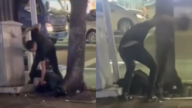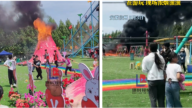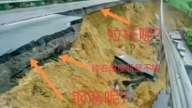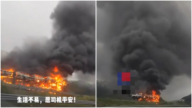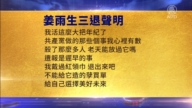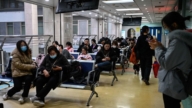【新唐人2013年09月12日讯】中共最高检察院和最高法院周一联合发布司法解释,声称如果网民制造诽谤性内容,并吸引至少5000个点击量或被转发500次,他们将面临诋毁指控并可能被判三年监禁。这样的司法解释不但引发中国网民的炮轰,而且受到海内外法律界人士从法理上的质疑。有美国律师指出,两高司法解释非常荒唐,是当局打压民众,把民事化的自诉案件政治化的一种典型表现。而在美国,对于言论自由最重要的一个原则是,民众对政府官员提出任何控告,除非是恶意,都不构成诽谤。
美国纽约执业律师李进进指出,诽谤案件实际上是民事案件的一个延伸。在美国做律师的,很少听到诽谤有罪,他迄今还没有碰到诽谤构成罪的情况。
纽约执业律师李进进:“诽谤罪的前提条件是自诉案件。告诉的才处理。谁告呢?在中国来讲,比较明显的他可能是政府官员,说政府官员贪污腐败,传播新闻,造成了对国家政府官员的影响,实际上他把民事案件,如果这样来确定它,在这样一个打击网络谣言的时候把它定下来,它是一种政治行为。”
李进进表示,两高司法解释的荒唐之处在于,民众的揭发,本来是对国家政府官员进行监督的,现在变成了有可能构成犯罪。
两高司法解释的第二个荒唐之处在于把诽谤罪量化。《刑法》规定,情节严重的才构成犯罪。李进进认为,最高法院试图通过用“吸引5000个点击量或转发500次”,这样的量化来达到所谓的“情节严重”。
纽约执业律师李进进:“但是我们并不知道最高法院,你凭什么就量化转发500次它就变成情节严重?根据是什么?501次算不算?499次算不算?500次是怎么计算出来的?显然是为了达到控制舆论的目的。一种威胁遏制。这是最高法院做这件事情是很荒唐的地方。”
李进进表示,在现在网络化的情况下,一个事件转发500次,在中国这样一个人口众多网络发达的社会里面,这是一个很普遍的事情。
第三点,也是最重要的是,李进进指出,诽谤和言论自由是永远分不开的,言论自由不能定义为,正确的可以讲,不正确的就不能讲。
纽约执业律师李进进:“特别是在政治问题上,没有正确,所有政治都没有正确的东西。政治就是党派,政治就是一部分人的利益。有什么正确呢?少数人他有发表意见的权利。真理不在哪一个人的手里。真理是在各种不同意见的碰撞当中产生出来的。”
对于官员,美国的言论自由有一个最基本的原则,就是1964年苏利文案件确定的原则。美国最高法院在此案中确立了,要求官员或公众人物在指控媒体报导涉嫌诽谤或侵害名誉时,必须遵循的真实恶意原则。该案是保障新闻自由的关键判决。
纽约执业律师李进进:“这是美国言论自由一个最基本的概念。你现在意图通过你国家权力,打击你的对手,保护你的官员,那最高法院就是和这个恶势力,和反动势力,同流合污。”
李进进上世纪70年代曾在中共部队服役以及任职公安。1978年考入中南政法学院,1987年入北京大学攻读博士学位。1989年中共前领导人胡耀邦逝世,他是最早出来参与组织天安门广场静坐,以及提出七条要求的学生代表之一。“六四”后被捕,1991年4月获释。1993年1月以访问学者身份到美国。1998年在威斯康辛大学获得法学博士学位。现为纽约执业律师。
采访编辑/秦雪 后制/李勇
US Lawyer Critiques China’s Judicial Interpretation for Online Posts
Recently, China’s supreme court and top procuratorate
jointly issued an interpretation on new measures.
It claims that internet users can face charges,
or a jail sentence, if their online posts are read
5,000 times, or if they are reposted 500 times.
This judicial interpretation has caused
widespread debate amongst netizens.
It has also questioned by legal
professionals inside and outside China.
US lawyers have highlighted that
the interpretation is very absurd.
It is deemed a typical example of authorities suppressing
civilians, and using politicized private prosecution.
In the US, an important principle of freedom of speech
is that people will not be charged with defamation if
they report on any official, except if it is “actual malice".
New York lawyer Li Jinjin said that
defamation is an extension of civil law.
It is rare to see someone was charged with defamation.
Li is not also aware of anyone who
has been sentenced for defamation.
Li Jinjin: “Private prosecution
is a prerequisite for defamation.
It can be handled only upon complaint.
Who is the prosecutor? In China, it is
obvious that the prosecutors are officials.
People are likely to have reported
information on a corrupt government official.
This results in an impact on the Chinese regime’s officials.
Actually, in China, the authorities made it as civil cases,
at the time of campaign to suppress online rumors.
This is a political act."
Li Jinjin said that the important point about this is
that people’s complaints should be a good thing.
It helps a country supervise it’s government officials.
However, now people can face defamation charges.
The judicial interpretation states that an internet
user could face defamation charges if his post
reaches a defined quota of views or re-posts.
Criminal Law stipulates this is if the circumstances
are serious enough, a crime is committed.
Li Jinjin believes that the supreme court intends
to use 5,000 views or 500 reposts to achieve
the status of “serious circumstances".
Li Jinjin: “I can’t understand how the supreme court
classified 500 reposts as a “serious circumstance"?
What is this according to? If it has
499 or 501 reposts, does it count?
Where does 500 come from?
The outcome seems to be aiming to achieve
the purpose of controlling public opinion.
This is a threat, and is suppression.
The supreme court’s act is ridiculous."
Li Jinjin said that now is the internet era, and it
is easy for an event to be reposted 500 times.
China has a large population, and
social networks are very developed.
This is a very common issue.
Li Jinjin said the most important point is that defamation
and freedom of speech can never be separated in China.
Freedom of speech doesn’t mean that if something
is correct according to a regime, you are allowed
to say it, and if it is not correct, you cannot say it.
Li Jinjin: “This is especially on political issues.
There is no clear concept for what the right thing is.
Politics is partisan, and a group of people’s interests.
Only a minority have rights to express their opinion.
The truth is not determined by any one person,
as it is created from different opinions."
There is a fundamental principle of freedom
of speech in the US, based on the case of
The New York Times v. Sullivan in 1964.
The US Supreme Court established an
“actual malice" standard from this case.
This standard has to be met before a press report about
public officials or public figures be considered defamation.
Hence, this has allowed free reporting on
civil rights campaigns, and is one of the
key decisions supporting freedom of press.
Li Jinjin: “This is fundamental concept
of freedom of the press in the US.
If the Chinese regime uses state power against
critics and to protect its officials, then the
supreme court is complicit with this evil force."
Li Jinjin was a policeman, and
served in army in the 1970s in China.
Li studied in Zhongnan University of Economics and Law
in 1978, then studied in Peking University for PhD in 1978.
He participated in the Tiananmen Square
students sit-in protest in 1989, when former
communist leader Hu Yaobang died.
He was one of students’ representative who
raised seven requirements to the regime leader.
After the incident, he was arrested,
and released in April in 1991.
Li traveled to US study in 1993.
He earned his law degree in 1998 at the University of
Wisconsin, and currently serves as a lawyer in New York.



